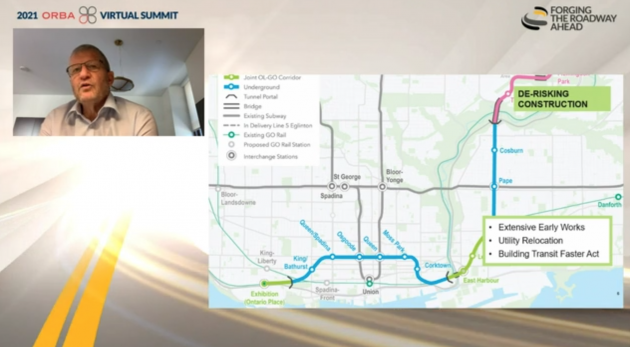
Features
Event Reports
Aggregates
Metrolinx update at ORBA Virtual Event
Metrolinx has put a big push on safety and COVID-19 guidelines
March 9, 2021 By Jay Koblun

Phil Verster, president and CEO of Metrolinx shared on innovation in Metrolinx’s COVID-19 response, construction technology, de-risking construction, lessons learned in procurement and the importance of being a trusted business partner at the Ontario Road Builders’ Association’s (ORBA) Virtual Event in February.
Verster oversees a team committed to transforming transportation in the Greater Golden Horseshoe. He joined Metrolinx in 2017.
“We always love being with ORBA, it’s a great crowd of people. You’re irreplaceable for Ontario, especially in this post-COVID period for the work you do. I’m just very thankful and humble you invite me here to talk to you again,” said Verster as he began his presentation titled, “Innovation: It’s Happening.”
Verster said figuring out where Metrolinx is headed over the next few years has been really important in the post-COVID world. He shared some of the innovative guidelines and policies Metrolinx included in its day-to-day practices in response to the pandemic.
“We put seat dividers on all vehicles, polycarbonate screens for all buses and stations, twice daily cleaning and evening deep cleanings, mandatory face coverings, sanitiser dispensers throughout the network, and 26 stations with Health and Safety kiosks,” he said. “These things are small things about innovation that helps how we think.”
Verster said over the last few years he and his team have focused on being more innovative. Metrolinx has implemented a personal track safety program, a Canadian common safety method for risk evaluation and assessment program, a safety ambassador program, and new PPE and training standards for the workforce and contractors.

“Without safety, we’ve got nothing,” he said. “Please, whatever you do, make safety part of your day. Pat of your way of thinking. It is fundamental and crucial to the success of all of us in this industry.”
Verster said one of the biggest recent innovations from Metrolinx is that it is has started more and more work that shifts from fixed price contracts to construction management-type target pricing contracts.
The far end of the spectrum of a target-price approach is an Alliance Model which Metrolinx is following with Union Station.
“An Alliance is a free-standing separate entity. Metrolinx people are represented in that entity together with the contracting team, the engineering team. And everyone has a common aligned objective. And not even myself can instruct how the project is delivered. The Alliance decides how that project is delivered. This is very different to other contracting models,” said Verster, adding that he thinks it is the first time it has been used in transit in Canada.
“We all want to get to the same result. I want to get transit built and if this is a contracting form that helps us get that done better, I’m very keen to hear from all of you how we can do more of that.”
Verster finished his presentation with a short question and answer period. He was asked “How is Metrolinx dealing with COVID-19 outbreaks on site? And are there any lessons learned that you can share with ORBA members?”
Verster said there are two different types of sites that we have.
“There are sites that are our own, and there are sites that are the sites of the other entities involved in the project. No matter what the site it is, I’ve got to say, nothing has changed. In terms of what is good to do and what is not good to do. The basics are crucial. The most valuable lessons are the ones we had right from the beginning. Figure out how to make physical distancing in a construction world,” he said, acknowledging how big of a challenge depending on the task.
“Face masks are crucial. The culture around hand cleanliness and not touching your face is crucial. The culture of doing things such as temperature checks regularly. These are not big, complicated items but seeing an adherence to that [the guidelines], and seeing adjustments to do that is absolutely crucial.”
Print this page